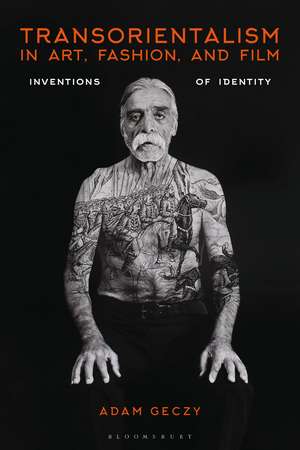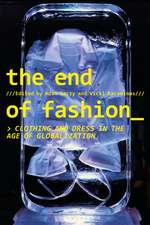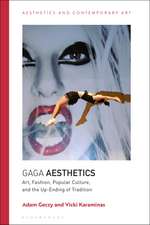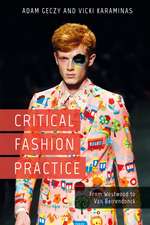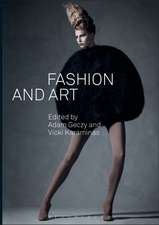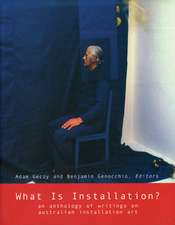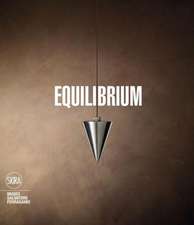Transorientalism in Art, Fashion, and Film: Inventions of Identity
Autor Adam Geczyen Limba Engleză Paperback – 22 iul 2020
| Toate formatele și edițiile | Preț | Express |
|---|---|---|
| Paperback (1) | 224.41 lei 43-57 zile | |
| Bloomsbury Publishing – 22 iul 2020 | 224.41 lei 43-57 zile | |
| Hardback (1) | 569.22 lei 43-57 zile | |
| Bloomsbury Publishing – 9 ian 2019 | 569.22 lei 43-57 zile |
Preț: 224.41 lei
Preț vechi: 288.71 lei
-22% Nou
Puncte Express: 337
Preț estimativ în valută:
42.95€ • 46.67$ • 36.11£
42.95€ • 46.67$ • 36.11£
Carte tipărită la comandă
Livrare economică 21 aprilie-05 mai
Preluare comenzi: 021 569.72.76
Specificații
ISBN-13: 9781350175334
ISBN-10: 1350175331
Pagini: 248
Ilustrații: 40 bw illus
Dimensiuni: 156 x 234 x 16 mm
Greutate: 0.35 kg
Editura: Bloomsbury Publishing
Colecția Bloomsbury Visual Arts
Locul publicării:London, United Kingdom
ISBN-10: 1350175331
Pagini: 248
Ilustrații: 40 bw illus
Dimensiuni: 156 x 234 x 16 mm
Greutate: 0.35 kg
Editura: Bloomsbury Publishing
Colecția Bloomsbury Visual Arts
Locul publicării:London, United Kingdom
Caracteristici
Features a range of international case studies, taking us from Japan and China to India, Turkey, Iran and the modern Islamic diaspora.
Notă biografică
Adam Geczy is an artist and writer, and teaches at Sydney College of the Arts, the University of Sydney, Australia. He is the author and co-author of numerous books, the most recent being The Artificial Body in Fashion and Art (Bloomsbury, 2017) and (with Vicki Karaminas) Critical Fashion Practice (Bloomsbury, 2017).
Cuprins
List of IllustrationsAcknowledgmentsIntroduction 1. Histories of Cultural Fabrication2. Occidentalizing the Orient: Modern Turkey3. The Global Turkish Artist 4. Art and the Islamic Female Diaspora5. "China", or Contemporary Chinoiserie6. Japanese Recreations: Between Kawakubo and Cosplay7. Indian Interdependence8. From Primitive to Provocative: First Nations in End TimesBibliographyIndex
Recenzii
Bringing a new perspective to the well-known concept of 'Orientalism,' Geczy smashes the binary worlds of West and non-West . Providing compelling world examples, he pushes readers to question ideas of identity for individuals and cultures about what is fixed, fluid, and hybrid.
Geczy is adept at sweeping into his critical vision the many manoeuvres of contemporary theory as if they are weapons to blast structuralism's straightjackets. This is a new voice that deconstructs the East/West binary in ways that return agency to those it othered.
Erudite, lucid, sensitive and eloquent, the depth of Transorientalism's research is impressive . There have been many books on cultural formations and transnational aesthetics, but none like this. [An] essential resource and highly influential text.
[Transorientalism in Art, Fashion, and Film] is a sensitive and informative account of expressions of culture and identity within fashion and the arts that exemplify transorientalism. As such, it offers an important contribution to the field of fashion studies and a useful guide to the convergence culture of our time.
Geczy is adept at sweeping into his critical vision the many manoeuvres of contemporary theory as if they are weapons to blast structuralism's straightjackets. This is a new voice that deconstructs the East/West binary in ways that return agency to those it othered.
Erudite, lucid, sensitive and eloquent, the depth of Transorientalism's research is impressive . There have been many books on cultural formations and transnational aesthetics, but none like this. [An] essential resource and highly influential text.
[Transorientalism in Art, Fashion, and Film] is a sensitive and informative account of expressions of culture and identity within fashion and the arts that exemplify transorientalism. As such, it offers an important contribution to the field of fashion studies and a useful guide to the convergence culture of our time.
